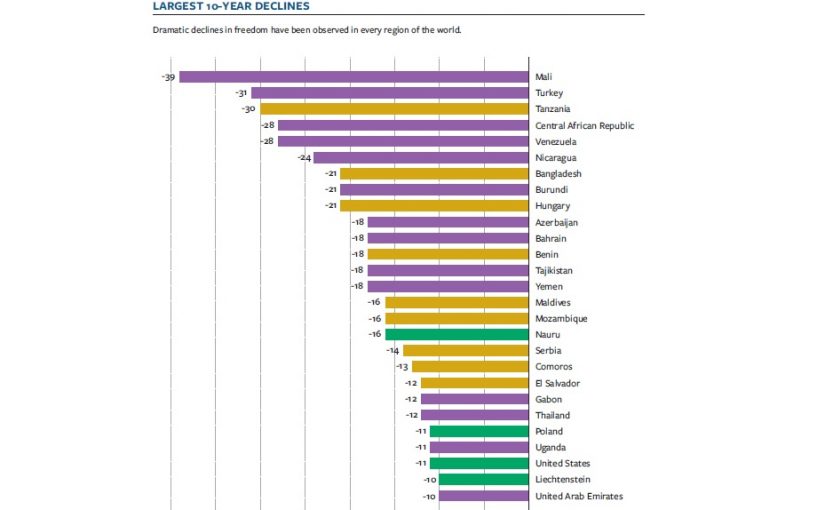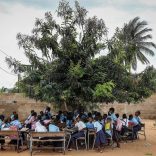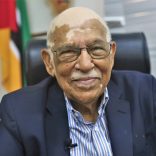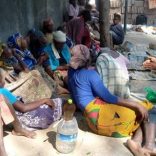Mozambique: More than 400 school classes are taught in the open in Matola municipality
Freedom House lists Mozambique among “largest 10-year declines” in latest report

Image: Freedom House
Mozambique is among the countries that have seen the greatest decline in the political rights and freedoms of its citizens over the past decade, Freedom House annual report released on Wednesday says.
The document, entitled ‘Freedom in the World 2021 – Democracy Under Siege’, which analyses a total of 49 countries, indicates that Mozambique’s index score has decreased by 16 points in the last decade, with Mali, Turkey and Tanzania recording the largest falls (39, 31 and 30 points respectively).
Included in the “partly free” regime category, Mozambique ranks 16th among the 27 countries that have retreated most in the Freedom House listing since the beginning of the 2010s. Detailed country reports for Mozambique and others are not available yet, but will be released by Freedom House soon.
The Washington-based non-governmental organisation says that only 16% of the 49 sub-Saharan African countries have “free” status, while 43% are “partly free” and 41% of them are “not free”.
The Freedom House report is based on six criteria – electoral process, participation and political pluralism, government functioning, freedom of expression and religion, associative and organisational rights, the rule of law and personal autonomy and individual rights.
While highlighting the violence that has been taking place in northern Mozambique, Freedom House indicates Ivory Coast, Ethiopia and Malawi as other sub-Saharan countries whose trajectory must be monitored with greater attention throughout 2021.
Sub-Saharan Africa has seen some “isolated” gains in political rights and civil liberties, but setbacks on democracy have increased.
Of the 12 countries considered “the worst of the worst” by the report, Sub-Saharan Africa includes five – Eritrea (the second worst), South Sudan (third), Equatorial Guinea (fifth), Somalia (seventh) and Central African Republic (RCA, tenth), with one North African state – Libya (12th) – also entering the category.
In Côte d’Ivoire, the document highlights that the Ivorian President, Alassane Ouattara, defied the constitutional limit of presidential terms and won a third term as head of state, in a process marred by disqualifications of other candidates, an opposition boycott and widespread political violence.
In Ethiopia, the document continues, the government, initially reformist, responded to political and ethnic unrest with mass arrests and a military offensive in the Tigray region, leading to widespread and flagrant human rights violations.
One of the few positive highlights concerns Malawi, where, after the 2019 elections were annulled by the Constitutional Court, the vote was re-run without incident, and the elected government has since made “progress in the fight against corruption”.
In reference to Mozambique, Freedom House notes in the report that “violence and forced displacement expanded” in the country where “Cabo Delgado Province has been the site of a growing insurgency”.
The report also highlights positive developments in Sudan, whose ongoing reforms have improved academic freedom, and where female genital mutilation was banned and a law that restricted women’s travel abroad was repealed.
“However, an increasing number of countries have seen declines due to new limits on freedom of movement, as well as violent and fraudulent elections that have prolonged the already long-term mandates of incumbent presidents,” reads the document, which gives as example the case of Côte d’Ivoire, but also Tanzania and the Central African Republic (CAR), where the elections were characterised by government repression and violence.
In Togo, the presidential election was marked by charges of fraud, with only a small group of observers authorised to monitor a dubious process which gave a fourth term to President Faure Gnassingbé.
Accusations of fraud and the use of Covid-19 pandemic restrictions to prevent voter registration cast doubt on the presidential elections in Guinea-Conakry, where Alpha Condé secured a third term after planning a referendum to suspend term limits.
Mali’s democratically elected leaders were overthrown by a military coup and, as a result, the country’s status fell from “partially free” to “not free”.
Forced displacement of populations and restrictions on freedom of movement contributed to the decline in scores in five countries, including Ethiopia.
In Cameroon, conflict between the government and separatist groups has also driven people out of their communities, with separatists applying their own movement restrictions and targeting students and teachers in English-speaking regions.
Burkina Faso has also been under attack by Islamic insurgents, with the population having to deal with ostentatious pro-government paramilitaries and disproportionate Covid-19 restrictions.
Rwanda’s public health rules have been aggressively implemented, with dozens of people arrested and tortured in custody.
‘Freedom in the World’ is Freedom House’s flagship annual report, assessing the condition of political rights and civil liberties around the world. It is composed of numerical ratings and supporting descriptive texts for 195 countries and 15 territories. ‘Freedom in the World’ has been published since 1973, allowing Freedom House to track global trends in freedom over more than 40 years.
- You may read the full Freedom House ‘Freedom in the World 2021 – Democracy Under Siege’ report HERE.













Leave a Reply
Be the First to Comment!
You must be logged in to post a comment.
You must be logged in to post a comment.